Financial Insights into Pet Bird Ownership Costs
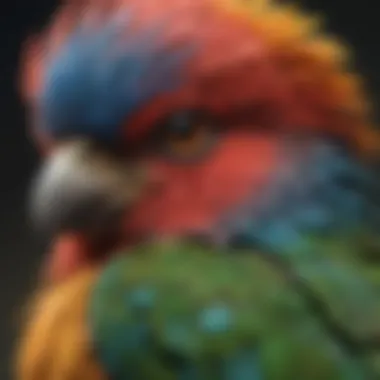
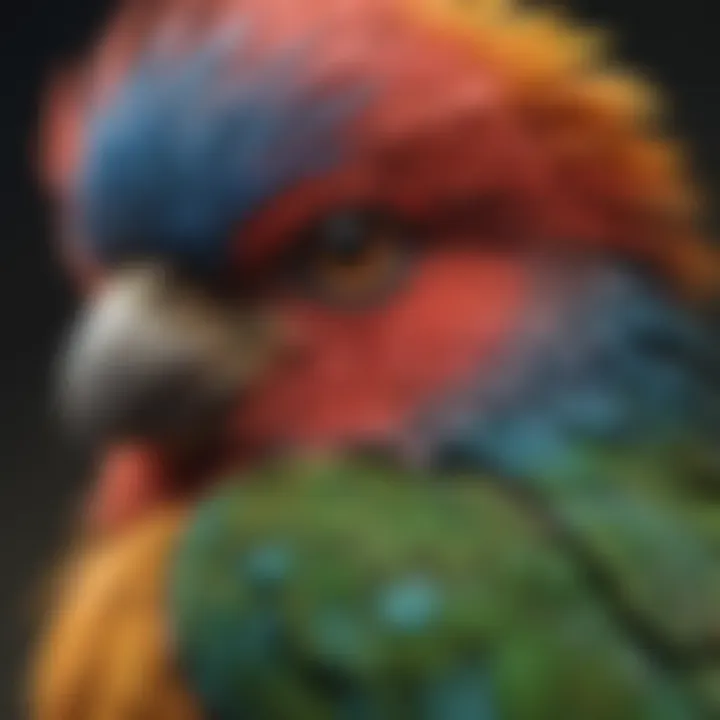
Intro
Owning a pet bird can be an enriching experience, yet it also comes with financial commitments that can be substantial. Many prospective bird owners tend to focus exclusively on the initial purchase price, often overlooking the ongoing and hidden costs. A comprehensive understanding of the financial considerations is vital for both new and experienced bird enthusiasts. In this article, we will dissect the various costs associated with bird ownership, including purchase prices, daily care, dietary needs, healthcare, and other elements that contribute to the overall expense of keeping pet birds.
Care Tips
Daily Care Routines
Daily routines for pet birds encompass feeding, social interaction, and environmental maintenance. Birds require fresh food and water each day to maintain their health. Depending on the species, the cost of quality bird food can range from a few dollars to much more. Regular engagement is crucial for their well-being, with many birds requiring hours of social interaction each day. Additionally, monitoring their behavior and health can help prevent issues down the line.
Cage Setup and Maintenance
Setting up the right living environment is a cornerstone of bird ownership. The cage should be spacious and comfortable. It is important to invest in a suitable model, as prices vary considerably based on size and material. Maintenance includes regular cleaning and inspecting for safety hazards. Washing the cage and replacing bedding or paper liners can be a weekly task. Budgeting for this recurring cleaning is essential for the overall health of your feathered friend.
Hygiene and Cleaning Practices
Ensuring proper hygiene is non-negotiable in bird care. Food bowls need cleaning daily to reduce the risk of infections. The same applies to water containers. Antibacterial wipes or safe cleaners should be used for the cage to prevent the buildup of harmful bacteria. Regular nail trimming and feather maintenance also contribute to your bird’s overall health and can incur additional costs if a professional groomer is needed.
Seasonal Care Adjustments
Birds may require different care practices as seasons change. In colder months, adding extra heat sources or blankets can enhance comfort. In summer, ensuring proper ventilation is vital to prevent overheating. These adjustments might come with extra costs, so plan ahead to meet their changing needs throughout the year.
Behavioral Insights
Understanding Bird Body Language
Recognizing how your bird communicates through body language is crucial for developing a strong bond. Birds display various behaviors to express emotions such as agitation, contentment, or fear. Learning to interpret these signals can help you respond appropriately to their needs.
Common Behavioral Issues and Solutions
Birds can exhibit behavioral problems such as excessive screeching or feather plucking. Often, these behaviors arise from stress or boredom. Addressing these issues may involve reallocating your budget towards better toys or environmental enrichment.
Positive Reinforcement Techniques
Utilizing rewards for positive behaviors is effective in training birds. This can include treats or praise. The cost of quality treats adds up, but the investment leads to better-behaved pets and a harmonious household.
Social Interaction Needs
Birds are social creatures that thrive on interaction, both with humans and other birds. Considering the cost of acquiring an additional companion bird can have significant implications if you opt for social species. Engage with your birds frequently to keep them mentally stimulated.
Nutrition Guides
Essential Diet Components
A balanced diet is critical for your bird's health. Seed mixes, pellets, and fresh fruits and vegetables form the core of their nutritional needs. Be mindful that premium diets may be more expensive but can contribute to a longer, healthier life. Regular purchases of fresh produce also add to the monthly budget.
Safe and Toxic Foods
Being aware of which foods are safe or toxic is paramount. Common foods like avocados, chocolate, and caffeine are harmful. Educate yourself thoroughly to avoid costly health issues that can arise from improper feeding.
Supplements and Treats
Occasional supplements may be necessary to fill dietary gaps. You should factor in the cost of these products as part of your regular spending. Treats can offer enrichment, but should be offered sparingly to maintain health.
Feeding Strategies for Different Species
Different species have varied dietary requirements. For example, larger parrot species may eat more than smaller birds, impacting long-term food costs. Research the specific needs of your bird to optimize care and budget appropriately.
Wellness and Health
Routine Health Checkups
Regular veterinary visits for checkups are essential, as birds can hide illnesses well. The cost of routine visits might seem minimal, but it can add up. Investing in annual health assessments is crucial.
Identifying Symptoms of Illness
Learn to recognize signs of illness early, such as changes in appetite or behavior. The sooner an issue is detected, the less costly it may be to treat.
Preventative Care and Vaccinations
Consulting a vet about vaccinations can significantly affect long-term health and expenses. Factor these potential costs into your budget to ensure compliance with recommended schedules.
Mental and Emotional Well-being
Maintaining mental and emotional health is important. Budget for toys and social interaction, as these play a role in preventing behavioral issues and health problems.
Enriching Activities
Toys and Playtime Ideas
Engaging your bird in playtime reduces boredom and promotes physical health. The cost of various toys can vary, and investing regularly in new items will keep your bird stimulated.
Training and Tricks
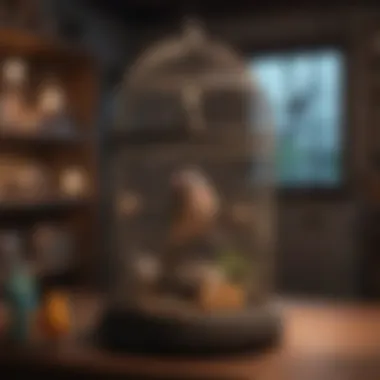
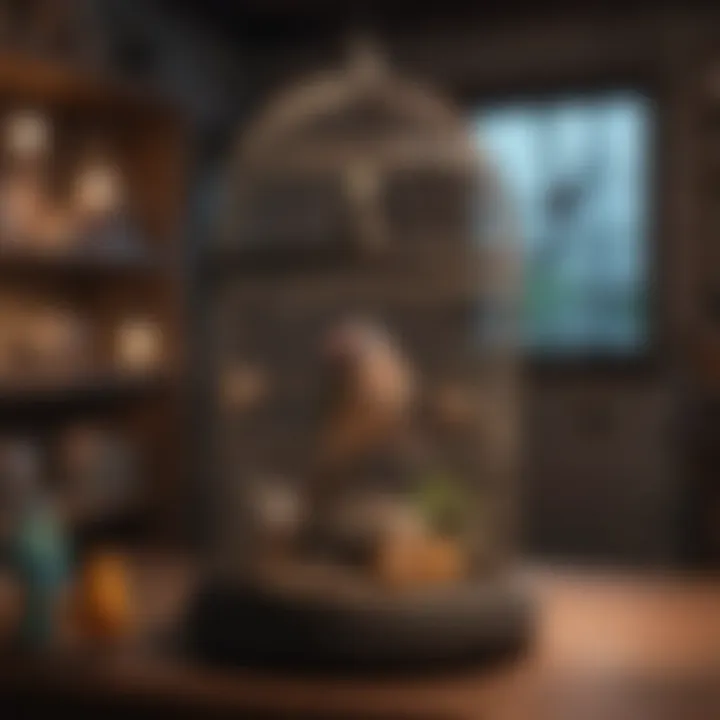
Training offers mental stimulation and can strengthen the bond between bird and owner. Investing time and perhaps instructional materials can enrich this process.
Outdoor Activities and Interaction
If feasible, allowing your bird outdoor time can be beneficial. Be mindful of safety measures, such as harnesses or pet carriers, which may require extra expenses.
DIY Projects for Mental Stimulation
Many owners find joy in creating their own toys for their birds. These DIY projects can often be cost-effective and personalized, enhancing the environment your bird lives in.
It is vital to approach bird ownership with a clear understanding of the associated costs. By carefully planning for these financial commitments, you ensure the long-term health and happiness of your feathered companions.
Prolusion to Pet Bird Ownership Costs
Owning a pet bird can be a rewarding experience, but it comes with its own unique financial considerations. Many prospective pet bird owners may only think about the initial purchase price, but the costs continue well beyond that. Understanding the financial commitment involved in bird ownership is crucial for anyone considering this responsibility.
Pet birds require specialized care, which can lead to various ongoing expenses. From food to medical care and housing, each aspect contributes to the total cost of ownership. Recognizing these factors upfront can assist potential owners in making informed decisions about which species to adopt and how to budget effectively.
A detailed overview of the costs associated with pet birds can prevent surprises down the line. Many owners may overlook essentials such as environmental enrichment or unexpected veterinary bills. This article addresses these issues by providing a comprehensive guide, breaking down the financial needs for both new and seasoned bird owners.
Understanding the financial aspects helps ensure the bird's happiness and health, making it a worthwhile aspect of bird ownership.
Understanding the Financial Commitment
The decision to bring a pet bird into one's home is significant. It's not merely about purchasing a vibrant feathered friend. Instead, it involves a deep understanding of the financial commitment required over the lifespan of the bird.
Here are some key elements to consider:
- Basic Expenses: Consider the fundamental costs involved, such as food, housing, and initial setup.
- Ongoing Supply Needs: Birds need regular purchases of supplies like toys and grooming tools.
- Health Costs: Regular veterinary check-ups and potentially high costs from emergencies.
"A true understanding of the costs can create a fulfilling and secure environment for your pet bird."
Bird ownership can span many years depending on the species. Therefore, long-term financial planning is essential. Each type of bird, from budgies to larger parrots, may have varying expenses that can greatly impact one’s budget.
Learning about the costs of ownership can prevent feelings of being overwhelmed. All pet owners must be prepared to adapt their finances to accommodate their bird's needs as they arise.
Initial Purchase Prices
Understanding the initial purchase prices of pet birds serves as a crucial starting point for potential owners. The initial financial outlay provides clarity on what resources are needed before making a commitment to bird ownership. Many people may underestimate the costs involved, thinking primarily about the upfront price of the bird. However, acknowledging the full scope of these expenses can help potential bird owners prepare better and ensure they can provide a stable and loving environment.
Popular Bird Species and Their Costs
Different bird species come with varying price tags. Popular choices such as Budgerigars or Cockatiels can be more affordable, with prices typically ranging from $20 to $200. These birds are often available at pet shops, breeders, or rescue organizations.
On the other hand, more exotic species such as African Grey Parrots or Macaws can stretch initial costs significantly, anywhere from $1,000 to over $3,000. Factors that influence these prices include:
- Species rarity: Less common birds generally demand higher prices.
- Breeder reputation: Well-known breeders may charge a premium for their birds, often due to their breeding practices.
- Age of the bird: Younger birds could be pricier, while older birds may come at a reduced cost.
When choosing a species, consider whether the initial cost aligns with your long-term financial plan.
Breeder vs. Rescue Adoption Fees
Choosing between adopting from a rescue and purchasing from a breeder presents different financial implications. Adoption fees at rescues typically range from $50 to $400. This fee often covers initial veterinary care, vaccinations, and sometimes essentials like cages or food. Adopting a rescue bird can be a financially smart option that also supports animal welfare.
Conversely, purchasing a bird from a breeder usually involves higher costs, often ranging from $100 to several thousand, depending on the species and the breeder's practices. While breeders may offer more information about the bird's lineage, it is essential to spend time assessing the bird's health and temperament prior to making a purchase.
In summary, understanding both the purchase prices associated with different species and the options available through breeders and rescues can help prospective owners make informed decisions about entering the world of pet bird ownership. This approach can facilitate a more satisfactory experience, avoiding financial strain down the road.
Housing Expenses
The housing of pet birds plays a crucial role in their overall well-being and is a significant financial consideration for owners. Selecting the right cage and creating an enriching environment requires careful thought and investment. It's not merely about purchasing a cage; the quality, size, and accompanying accessories contribute substantially to the costs involved. Proper housing can lead to healthier, happier birds, making it an essential aspect of responsible pet ownership.
Cage Costs: Size and Material Considerations
When considering the cage, size is one of the most critical factors. Birds, depending on their species and size, need adequate space to move around comfortably. The general guideline is to provide a cage that allows the bird to spread its wings without obstruction. For example, parakeets may require a minimum cage size of 18" x 18" x 24", while larger birds like cockatoos may necessitate dimensions starting from 30" x 30" x 36". While larger cages are more expensive, they can prevent behavioral issues that arise from confinement.
Material is another consideration. Cages are usually made from metal, plastic, or wood. Metal cages are popular for their durability, but the coating must be bird-safe to avoid toxicity. Stainless steel is a premium option that offers both safety and longevity, although it can be costly. Wooden cages may require more maintenance than metal ones, and they can also be prone to chewing damage, depending on the species.
Additionally, when budgeting for housing, think about the type of accessories needed. These can include perches, dishes, and toys that enhance the bird's experience. Over time, these costs accumulate, making it essential to factor them into the overall budget for housing.
Environmental Enrichment and Accessories
Creating an engaging environment for birds is vital to their mental and physical health. Environmental enrichment is not just an optional add-on; it significantly influences a bird's quality of life. Birds are intelligent creatures that thrive on stimulation and variety. Without it, they may become bored or stressed, leading to potential health problems.
Accessories such as toys, swings, and ladders are essential for providing an active lifestyle for your pet bird. The variety in toys can keep a bird entertained and mentally engaged. Natural wood toys, puzzle feeders, and foraging toys can have different price points, so budgeting according to your bird's needs is advisable.
Additionally, consider the layout of the cage. Simple modifications like different perch heights and placement of food and water can stimulate exploration. This approach enhances the bird's experience and maintains its physical fitness.
Overall, maintaining a pet bird's housing requires a substantial financial commitment and ongoing investment. Planning for these costs will promote a healthier, more stimulating living environment for your avian companion.
"Understanding the importance of proper housing for pet birds can significantly impact their happiness and health, just as it does with any other animal."
By ensuring adequate space and environmental enrichment, you create a home for your bird that supports their natural behaviors and well-being.
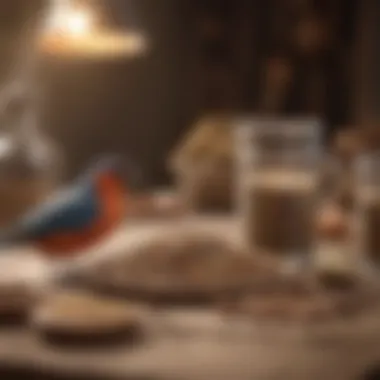
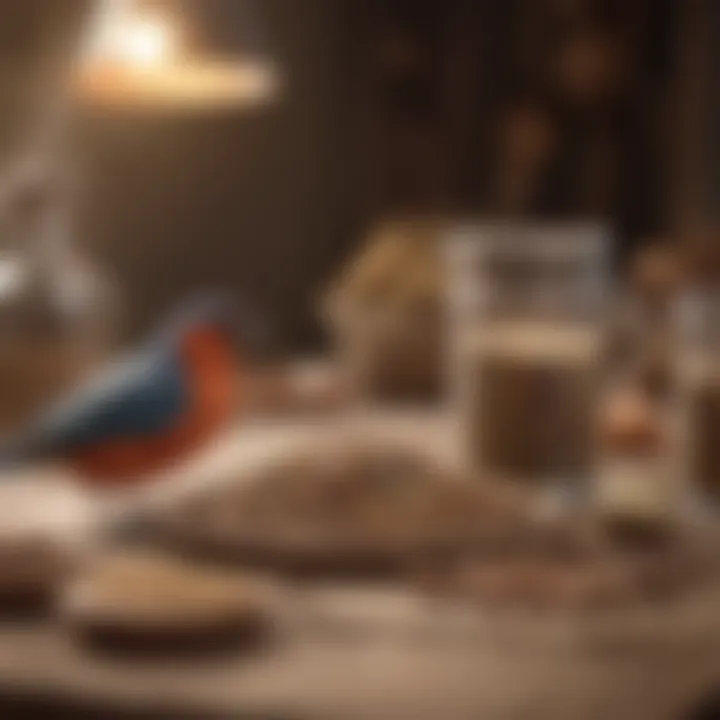
Dietary Requirements and Nutrition Costs
Proper nutrition is vital for the health and well-being of pet birds. The diet that one provides impacts their feathers, energy levels, and overall longevity. Evaluating dietary requirements means understanding not just what birds traditionally eat, but also the unique nutritional needs based on species, age, and health conditions. Bird owners need to grasp the implications of providing a balanced diet. This creates a foundation for good health, which is a long-term consideration that affects both the cost and quality of bird ownership.
Basic Diet vs. Special Nutritional Needs
Birds require a varied diet that often includes pellets, fresh fruits, and vegetables, seeds, and grains. Pellets can form the basis of a bird's diet, offering well-rounded nutrition that is specifically formulated for various bird types. Some common components of a basic diet are:
- High-quality pellets: These provide essential vitamins and minerals.
- Fresh fruits and vegetables: Such as apples, carrots, and leafy greens enrich their diet with antioxidants and hydration.
- Seeds: These can be offered in moderation, as they are high in fat.
However, various factors might necessitate special dietary adjustments. For example, breeding season, molting periods, or specific health conditions can dictate a need for specialized diets. Parrots may require higher fat and protein during breeding, while a bird recovering from illness might need softer food that is easy to digest. Owners should regularly consult with their avian veterinarian to determine if their bird has any unique dietary requirements.
Cost of Supplements and Treats
While forming a balanced diet around basic needs is essential, many bird owners also consider supplements and treats. These can enhance the nutritional profile but must be used wisely. The cost of supplements can vary widely, depending on the products chosen. Some common types of supplements include:
- Vitamins and minerals: These can come in liquid form or as additives to food.
- Probiotics: These support digestive health and can help with stress management.
- Calcium supplements: Necessary for laying females to ensure strong egg production.
Pet owners should not forget about treats. Safe options include fruits, nuts, and specially formulated bird treats. While treats can be a great way to increase bonding with birds, excessive reliance on them can lead to nutritional imbalances. Therefore, understanding the quality and quantity of these extras is critical for budgeting. Typically, bird owners could anticipate spending between $10 to $30 monthly on supplements and treats, depending on the specific needs of their avian companions.
In summary, understanding the dietary requirements of pet birds directly impacts health costs and quality of life. A budget should account for standard food sources, supplementation, and versatility in diet to address any special needs as they arise.
Healthcare and Veterinary Expenses
Caring for pet birds involves various responsibilities, and healthcare is among the most vital. These expenses can represent a significant aspect of bird ownership. Understanding the costs related to healthcare helps owners prepare financially and ensure their pets receive proper medical attention. Regular check-ups and unexpected healthcare events contribute to the overall financial picture of owning a bird.
Routine Check-ups and Vaccinations
Routine check-ups are an essential component of avian healthcare. Birds, like other pets, require regular visits to a qualified avian veterinarian. This helps catch potential health issues early, thus reducing the chances of serious illnesses. A typical vet visit can range from $50 to $150, depending on location and reputation of the veterinary practice.
During these check-ups, your bird may receive vaccinations. Vaccinations help protect against diseases that can be detrimental to avian health. Common vaccinations can add another $25 to $50 to your regular vet visit. Taking a proactive stance in your pet's health care helps maintain their well-being over the years, ultimately saving money in emergency situations.
Additionally, regular health assessments can include wing and feather examinations, beak care, and discussions about dietary needs. In the long run, having routine vet visits can keep your bird healthy and potentially reduce other veterinary costs.
Unexpected Healthcare Costs
Despite best efforts, unexpected healthcare costs can arise. Birds can be prone to sudden illnesses or injuries. An unexpected trip to the vet can cost anywhere from $100 to over $1,000 depending on the severity of the situation. Common emergencies include respiratory issues, accidents, or infections.
For instance, if your bird gets sick and requires hospitalization, the costs can escalate. Procedures like X-rays or blood tests are common and may range from $50 to several hundred dollars.
It is crucial for pet bird owners to have an emergency fund specifically for unexpected veterinary costs.
Planning for these potential expenses can alleviate financial strain when an emergency occurs. Many owners choose to set aside a portion of their monthly budget for veterinary care, ensuring they can respond quickly should a situation arise.
In summary, understanding healthcare and veterinary expenses is fundamental for anyone contemplating bird ownership. Regular check-ups and preparedness for unexpected costs play a key role in maintaining the health and happiness of your avian companion. Staying informed and financially ready allows owners to provide the best care possible.
Maintenance Costs
Understanding maintenance costs is crucial for anyone considering pet bird ownership. While initial purchase prices may draw attention, ongoing maintenance demands continuous investment. This encompasses daily cleaning, upkeep of cages, and ensuring a safe environment for the bird. These are vital elements for birds to thrive and live their best lives.
Cleaning Supplies and Cage Maintenance
Keeping a pet bird requires dedication to cleanliness. Birds, by their nature, can be messy. Their droppings, spilled food, and feather shed need regular tending. Therefore, bird owners should anticipate spending on cleaning supplies such as cleaning agents, scrubbers, and waste disposal items.
Common cleaning supplies include:
- Bird-safe disinfectants
- Cage liners or paper
- Scrub brushes and sponges
- Waste disposal bags
Regular cage maintenance is essential. This involves not just cleaning the substrate and surfaces but also examining the cage structure for wear and tear. Bird owners must check for loose wires or any damaged bars that could pose safety risks. Investing in quality materials or cages may lead to fewer replacements, saving money over time.
Time Investment and Maintenance
Beyond financial costs, maintaining a bird involves significant time commitment. Daily attention is required to clean the cage, refresh food and water, and provide enrichment activities.
Effective time management is needed to ensure the bird receives proper care. Setting aside specific times in the day for cleaning and interacting can create a structured routine.
Consider this:
- Cleaning the cage should be done at least every few days. This helps reduce odors and prevents bacterial growth.
- Fresh food and water must be provided daily. This is crucial to support the overall health of the bird.
- Enrichment activities should be rotated regularly to keep the bird engaged and mentally stimulated. This could involve toys, social interaction, or even supervised flight time outside the cage.
Insurance and Emergency Funds
Insurance and emergency funds are fundamental components of responsible pet ownership, particularly when it comes to owning pet birds. Unlike cats or dogs, birds can have unique health challenges that may necessitate specialized veterinary care. This section delves into the role of insurance and emergency funds, addressing both the advantages and considerations that every prospective bird owner should evaluate.
When considering pet insurance for birds, it’s prudent to think about common medical issues that affect different species. Birds can experience conditions like feather plucking, respiratory infections, or even accidents that result in injuries. Having insurance can significantly alleviate the financial burden associated with unexpected veterinary visits. While some may see insurance as an optional expense, the potential costs without coverage can be substantial. Hospitals often charge hundreds, and sometimes even thousands, for complex treatments.
Considering Pet Insurance for Birds
Pet insurance for birds can vary widely in terms of coverage and cost. It is beneficial to compare policies thoroughly before making a decision. Here are some key factors to consider:
- Coverage Options: Look for plans that cover routine check-ups, emergency care, and any specific conditions that may affect your type of bird.
- Price: Monthly premiums can differ based on the species, age, and health history of the bird. Research various providers to find a plan that fits your budget.
- Deductibles and Co-pays: Understand the deductible amounts and co-pay percentages, as these can impact your out-of-pocket expenses significantly during a claim.
- Exclusions: Pay attention to what is excluded from the policy. Some plans may not cover pre-existing conditions or may have waiting periods.
Creating an emergency fund specifically for your pet birds is equally important. An emergency fund serves as a financial safety net, ensuring immediate access to funds in case of unexpected expenses. Here are a few recommendations to help build this fund:
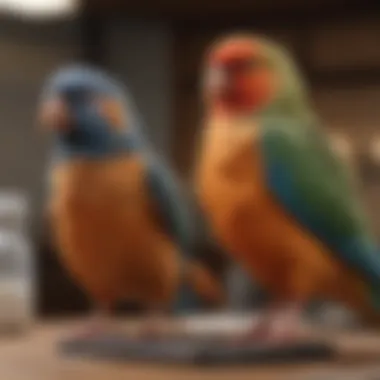

- Start Small: Begin by setting aside a small amount each month until you reach your goal.
- Establish a Separate Account: Keep your emergency funds in a dedicated savings account to avoid using them for regular expenses.
- Reevaluate Regularly: Adjust the target amount based on the changing health needs of your birds and any new expenses that may arise.
"Having insurance and an emergency fund is not just a financial strategy. It is an investment in the well-being of your pet birds."
Understanding the financial implications of pet ownership is crucial. Investing time in researching insurance and diligently saving for emergencies can significantly enhance your ability to provide care for your birds. These financial strategies are not merely precautionary; they reflect a commitment to your pet’s long-term health and livelihood.
Long-term Financial Planning
Long-term financial planning is crucial for anyone considering pet bird ownership. Birds can live for many years, some even up to several decades. This longevity indicates a significant commitment not just to care and companionship, but also to a sustained financial investment.
Key Elements of Long-term Financial Planning
Understanding the long-term financial implications of owning a pet bird involves analyzing various aspects of care and living conditions. Key elements include the following:
- Ongoing Care Costs: Basic expenses such as food, health care, and maintenance can add up over time. Budgeting should account for high-quality avian food and regular vet visits.
- Unexpected Costs: Birds can face health issues similar to those of other pets. Reserving funds for emergencies can prevent financial strain.
- Depreciation of Materials: Bird cages and accessories may need replacement or upgrading. As birds grow or change, their needs can change too, demanding a reevaluation of prior expenditures.
- Insurance Considerations: Investigating pet insurance options can be beneficial. While not all options are available specifically for birds, general pet insurance covering avian care can provide some financial security.
Benefits of Planning Ahead
Having a financial plan aids in managing ownership costs throughout the lifespan of a pet bird. Some of the benefits include:
- Reduced Stress: Knowing the financial landscape can help owners avoid surprises and plan for the future.
- Improved Care: With a well-defined budget, owners can allocate funds for better food, quality veterinary care, and enrichment tools for their birds.
- Informed Choices: Long-term planning enables owners to make informed decisions regarding species selection, housing types, and necessary accessories.
"Planning for the future is essential not just for survival; it promotes a better quality of life for both birds and their owners."
Important Considerations
While creating a long-term plan, consider these factors:
- Lifestyle Changes: Life circumstances can shift due to changes in work, family, or health. Planning allows for adaptability in care and expense.
- Potential Relocation: Moves may require adjustments in living arrangements for your bird, impacting housing costs.
- Longevity of Commitment: Birds require a commitment similar to that of long-term family members, emphasizing the need for financial dedication.
In summary, long-term financial planning is not merely an option for bird owners; it is a necessity. A thoughtful approach helps improve quality of life for both birds and their owners, ensuring a fulfilling relationship over the years.
Budgeting for Yearly Expenses
When managing the financial aspects of pet bird ownership, careful budgeting for yearly expenses is paramount. Understanding what these costs entail and planning accordingly can alleviate potential financial burdens.
Common Yearly Expenses
- Food: High-quality bird food can range in price. Depending on bird species, an owner may expect to spend anywhere from $300 to $600 annually.
- Healthcare: Routine vet visits, vaccinations, and preventative care can total $200 to $500 each year, though unexpected health issues could significantly raise this amount.
- Cage Maintenance and Supplies: Regular purchases of bedding, cleaning supplies, and toys can cost about $150 to $300 per year, depending on the number of birds.
- Environmental Enrichment: Investing in new toys and activities can promote your bird’s happiness and wellbeing. Budgeting around $100 to $200 yearly for enrichment is advisable.
Tracking and Adjusting Your Budget
Regardless of how well one plans, it is essential to track expenses throughout the year. Regularly reviewing spending habits can identify trends and enable owners to adjust their budget as necessary. Keeping a log of expenses helps in future budgeting and avoids unplanned financial shocks.
Establishing a solid financial plan with a focus on annual expenses is a crucial part of responsible pet ownership, particularly for animals like birds who may require unique considerations.
Special Cases and Unique Birds
When considering the financial aspects of pet bird ownership, special cases and unique birds deserve particular attention. These birds often require specific care, habitat, and feeding that differs from more common species like parakeets or canaries. This section aims to elucidate the financial implications of caring for these unique avian friends. Whether by choice or circumstance, potential owners should be acutely aware of the cost factors surrounding these special cases.
Rare and Exotic Species Pricing
The allure of rare and exotic bird species can be strong. However, the price associated with such birds can vary significantly compared to typical pet birds. For instance, parrots like the Hyacinth Macaw can cost upwards of $10,000, while rare finches may range from a few hundred to a few thousand dollars. Several factors determine the pricing of these birds:
- Rarity: The more uncommon the bird, the higher the price. Endangered species can command even higher fees.
- Breeding: Birds bred in captivity often cost less than those captured from the wild due to legal restrictions and ethical considerations.
- Legal Considerations: Some species require permits for ownership, adding a bureaucratic overlay to the financial process.
- Local Demand: Prices can fluctuate based on local demand and availability. A bird scarce in one area may be easier to find in another, which affects pricing.
"Owning a rare or exotic bird is not just about purchase cost; ongoing care can also be significantly higher due to their specialized needs."
Costs Unique to Specific Avian Types
Certain bird species have unique needs that can lead to additional costs. These considerations may include:
- Dietary Requirements: Exotic species often need specialized diets. For example, some require a mixture of fruits, vegetables, and high-quality pellets. This can increase monthly feeding costs significantly.
- Housing Needs: A large bird like a Cockatoo will require a spacious cage, often costing much more than typical cages for smaller birds. Additionally, custom aviaries can be necessary, which could escalate the investment.
- Healthcare: Certain species are prone to specific illnesses, sometimes necessitating specialized veterinary care. Routine check-ups might be costlier and may include more advanced diagnostics and treatments than for common birds.
- Environmental Enrichment: Many exotic birds thrive when provided with substantial enrichment. This could mean purchasing varied toys, natural perches, and complex flight systems to keep them stimulated, and all of these add to the overall costs of keeping these unique birds.
Engaging with special cases and unique birds undoubtedly elevates both the emotional and financial investment involved in bird ownership. Careful planning and research will yield a better understanding of what to expect when venturing into this more specialized realm of pet birds.
Comparative Costs of Other Pets
In this section, we will explore several aspects of pet ownership costs, comparing birds with more traditional pets like dogs and cats. Factors such as initial purchase prices, ongoing expenses, and potential hidden costs will be analyzed. The objective is to highlight the financial landscape of avian companions in contrast to other common pets.
A Financial Comparison with Traditional Pets
When comparing the costs of owning birds with those of traditional pets, several distinct elements come into play:
- Purchase Price: Generally, the initial cost of acquiring a bird can be lower than that of dogs and cats, particularly for common species like parakeets or cockatiels. While breeds such as poodles or purebred cats could require significant sums, birds typically have a lower entry price.
- Housing Needs: Bird owners must invest in a suitable cage to ensure the safety and comfort of their pet. The cost of a high-quality cage for a bird can vary but may sometimes be less than the costs of building a safe outdoor environment for dogs or providing litter boxes and scratching posts for cats.
- Dietary Costs: Birds often require a specialized diet that may include pellets, seeds, fruits, and vegetables. While the costs can add up, it might still be more affordable than feeding a dog high-quality dog food, which is usually necessary for their health. Cats, too, can have significant dietary needs, depending on their health and weight.
- Healthcare Requirements: Routine vet visits for birds can be less frequent than for dogs, particularly if the dog requires yearly vaccinations. However, bird health can be delicate, requiring specialized avian vets, which might lead to higher costs in specific circumstances. Pet insurance can play a vital role here by absorbing some expenses but can be costly, especially for birds.
- Miscellaneous Costs: Birds generally require less space and less exercise than dogs, which need daily walks, grooming, and playtime. Cats also have their own needs, like litter supplies and toys, which may escalate expenses over time.
For many pet owners, understanding these cost variances can influence their decision, ensuring they choose the pet that aligns with their financial situation.
Culmination: The Cost-Benefit Analysis of Bird Ownership
When undetaking the journey of pet bird ownership, a careful cost-benefit analysis is crucial. It encompasses evaluating not just the direct expenses, but also the overall value that a pet bird adds to one's life. The richness of companionship and joy that a bird may bring can sometimes outweigh the financial commitments involved.
In this article, various elements associated with bird care have been elaborated, which include initial purchase costs, housing needs, dietary requirements, healthcare, and maintenance expenditures. Each of these factors contributes to the broader picture of bird ownership and informs potential buyers about the realities they may face.
Key Considerations
- Initial Costs vs. Long-Term Commitment: Many individuals tend to focus solely on the purchase price of a bird, often neglecting the ongoing costs that are pivotal in ensuring good health.
- Emotional and Social Value: Many owners find that the companionship provided by their birds justifies the expenses. The interactions foster a bond that can positively influence one's lifestyle.
- Rescue and Adoption Opportunities: Opting for rescue organizations can lower initial costs, though ongoing expenses will still apply. The focus should always be on responsible ownership, regardless of the initial purchase plan.
A thorough understanding of the owner commitment, including possible hidden costs, is fundamental for making a well-informed decision.















